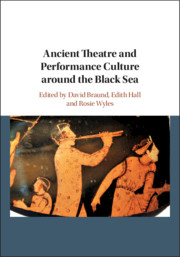Book contents
- Ancient Theatre and Performance Culture around the Black Sea
- Frontispiece
- Ancient Theatre and Performance Culture around the Black Sea
- Copyright page
- Contents
- Figures
- Notes on Contributors
- Preface
- Abbreviations
- Map
- Part I Approaches
- Part II Places
- 4 The Tragedians of Heraclea and Comedians of Sinope
- 5 The Phanagoria Chous
- 6 Theatre and Performance in the Bosporan Kingdom
- 7 Ancient Theatre in Tauric Chersonesus
- 8 Theatre at Olbia in the Black Sea
- 9 Celebrating Dionysus in Istros and Tomis: Theatrical Manifestations and Artistic Life in Two Ionian Cities of the Black Sea
- 10 Ancient Theatres and Theatre Art of the Bulgarian Black Sea Coast and Thracian Hinterland
- Part III Plays
- Part IV Performative Presences
- Epilogue: Dancing around the Black Sea: Xenophon, Pseudo-Scymnus and Lucian’s Bacchants
- References
- Black Sea Index
7 - Ancient Theatre in Tauric Chersonesus
from Part II - Places
Published online by Cambridge University Press: 12 November 2019
- Ancient Theatre and Performance Culture around the Black Sea
- Frontispiece
- Ancient Theatre and Performance Culture around the Black Sea
- Copyright page
- Contents
- Figures
- Notes on Contributors
- Preface
- Abbreviations
- Map
- Part I Approaches
- Part II Places
- 4 The Tragedians of Heraclea and Comedians of Sinope
- 5 The Phanagoria Chous
- 6 Theatre and Performance in the Bosporan Kingdom
- 7 Ancient Theatre in Tauric Chersonesus
- 8 Theatre at Olbia in the Black Sea
- 9 Celebrating Dionysus in Istros and Tomis: Theatrical Manifestations and Artistic Life in Two Ionian Cities of the Black Sea
- 10 Ancient Theatres and Theatre Art of the Bulgarian Black Sea Coast and Thracian Hinterland
- Part III Plays
- Part IV Performative Presences
- Epilogue: Dancing around the Black Sea: Xenophon, Pseudo-Scymnus and Lucian’s Bacchants
- References
- Black Sea Index
Summary
Tauric Chersonesus is a Greek city in south-west Crimea, founded in the middle or the third quarter of the fifth century BC by colonists from Heraclea Pontica, which in turn was a colony of Megara. It is the only Greek city in the north Black Sea littoral where performances of ancient drama can be now freely watched by the modern public (Fig. 7.1). The other Greek cities also had theatres, though they have still not been discovered. We hear about a theatre in the Bosporan kingdom, presumably in Panticapaeum, where, according to Polyaenus, a distinguished musician Aristonicus from Olynthus was going to play before the citizens while Archibiades from Byzantium, envoy of Memnon (a Rhodian general in the service of Philip II), had to count all of them in order to find out how many possible warriors were available (Polyaen. 5.44.1; see also Braund Chapter 6 in this volume). We are also aware of the theatre in Olbia in the fourth century BC, where popular individuals were customarily honoured during the celebrations of Dionysus (IOSPE I².25). An attempt at its approximate reconstruction has even been made, although we still do not know its exact location.
- Type
- Chapter
- Information
- Ancient Theatre and Performance Culture Around the Black Sea , pp. 106 - 134Publisher: Cambridge University PressPrint publication year: 2019

